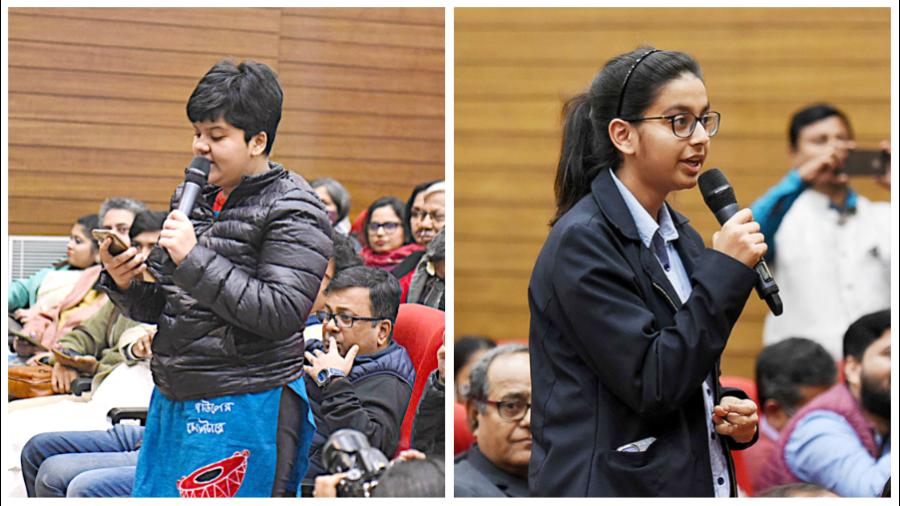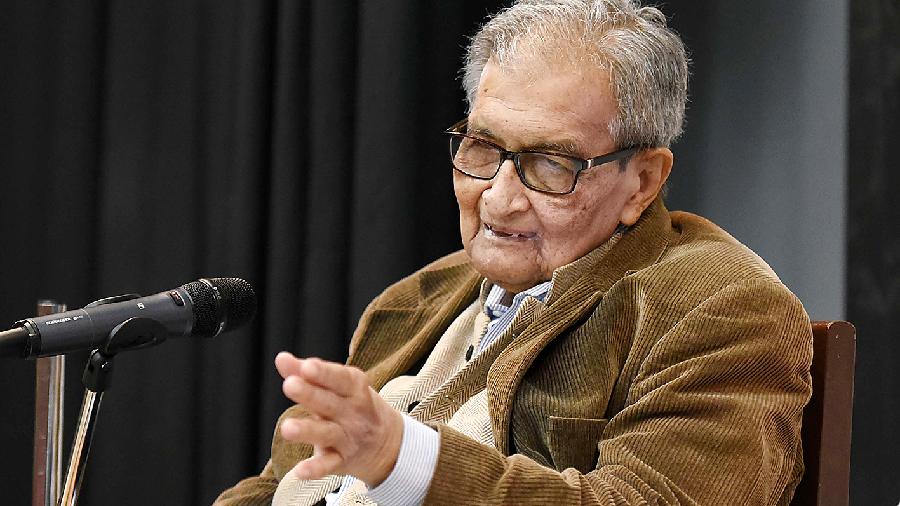- We share Christmas cakes, Id sewai and Saraswati Puja’s khichudi in school. What are the other ways to spread liberal thinking in educational institutes?
- How to explain the importance of diversity to a person who is not open-minded?
The questions were among those posed to Nobel laureate Amartya Sen by a bunch of school students on Sunday.
Sen, who was visibly impressed, answered in detail, stressing time and again the need of “yukta sadhana (working together)” of Hindus and Muslims and sharing delectable anecdotes that had the audience in splits.
Along with Rabindranath Tagore, a major influence on Sen has been Kshitimohan Sen, his maternal grandfather who taught in Santiniketan and was the foremost proponent of yukta sadhana. A step beyond mere tolerance, yukta sadhana means collaboration between Hindus and Muslims.
Kshitimohan Sen is the author of a tract, Bharate Hindu Musalman er Yukta Sadhana, which came out as a book in 1949, when India was steeped in communal polarisation.
Sunday’s programme, titled Yukta Sadhana, was an attempt to revisit Kshitimohan Sen’s idea of a joint Hindu-Muslim syncretic culture in the present times of deep religious divisions.
Organised by Pratichi Trust, set up with Sen’s Nobel Prize award in 1999, and Know Your Neighbour, a campaign that promotes communal harmony, the programme had over 100 students and some 40 teachers from several schools in and around Kolkata. The venue was the auditorium of the Amartya Sen Research Centre, the flagship institute of Pratichi Trust that opened in the middle of last year.

Rupkatha Sarkar and (right) Akshita Poddar were among the students who asked Amartya Sen questions
Rupkatha Sarkar, a Class VII student of Holy Cross School, asked the first question.
“We come from different families and backgrounds. In the school, we see an assimilation of different religions, languages and cultures. We share everything — Christmas cakes, Id sewai and Saraswati Puja’s khichudi. What are other ways to promote liberal thinking in schools in the current circumstances?” she asked.
Sen said people should encourage working together. “We should always look for connections. The connections do not have to be forged on something very serious all the time. Connections can be built over trivial things as well,” he said before sharing an anecdote.
Kshitimohan Sen’s elder brother, Abanimohan, knew Persian and had Muslim friends. Every evening, he would visit one of them, a Muslim priest, and together they would smoke tobacco and keep chatting. One day, Abanimohan Sen saw a Hindu priest passing by.
“The kazi invited him to join them. The Hindu priest said he could not. ‘You are a Muslim. There is nothing in common between us,’ he said. The kazi asked him to think again. ‘You make money by fooling poor Hindus and I do the same with poor Muslims. We may be different but our trade is very similar’,” Sen said.
Akshita Poddar, a Class XI student in Modern High School, wanted to know “how to advocate for diversity and inclusion before someone who doesn’t quite understand their importance or is not open-minded”.
Sen, who called it a “very good question”, said a lot of the problems of the world came from a lack of understanding and shared another nugget from his life.
In Delhi, Sen had taken his daughter Antara, then five years old, for admission to a reputable school. A teacher showed Antara a red pencil and asked what colour it was. Antara said nothing. The teacher then showed her a blue pencil and asked the colour. Again, no answer from the little one. “I was very depressed. As we walked out, my five-year-old daughter says: ‘Baba, what is wrong with this man? Is he colour blind?’,” said Sen.
“(There is a) Need for building trust. If a Muslim gentleman takes a different view, we need to ask the question, why is he taking a different view? The remarkable thing is that quite often, our ability to follow each other is extraordinarily limited. We go in different directions, like Antara thinking that the question was coming from a colour blind man,” he said.
“We live in a world where terrible misunderstanding is very common, between religion... We have all kinds of differences. Some of the differences come from illiteracy and ignorance,” he said.
Before the interactive session, Biswajit Ray, who teaches Bengali at Visva-Bharati, talked about Kshitimohan Sen’s ideals of yukta sadhana, occasionally reading out excerpts from his book.
“Speaking of the liberal aspects of Hinduism and Islam, Kshitimohan Sen points out various areas — like music, art, architecture, sculpture, folk songs — where this yukta sadhana has yielded dividends. He was committed to history and factual accuracy, well versed in Vedic traditions and Sanskrit language. Staying true to himself, he collaborated with others (Muslims), accepted them with open arms,” said Ray.
